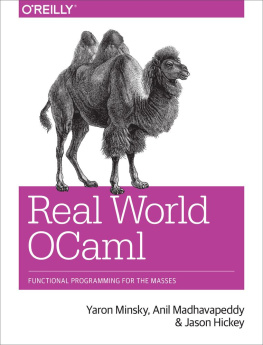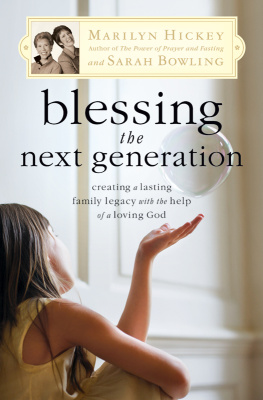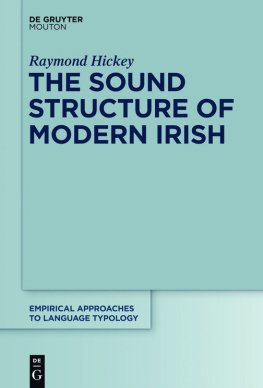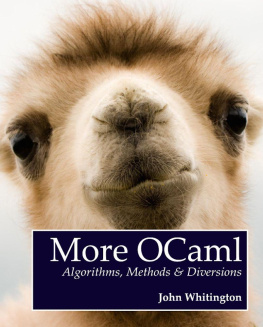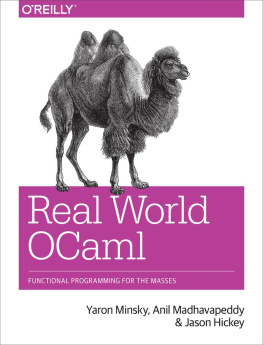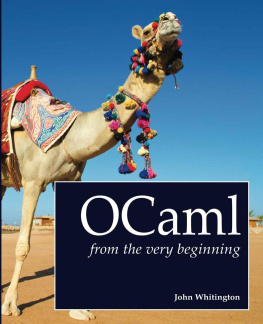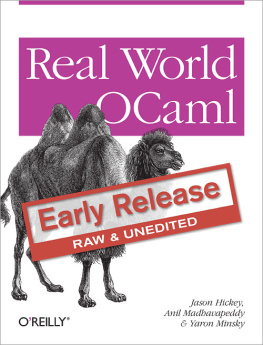Jason Hickey - Real world OCaml
Here you can read online Jason Hickey - Real world OCaml full text of the book (entire story) in english for free. Download pdf and epub, get meaning, cover and reviews about this ebook. City: Beijing etc, year: 2014, publisher: OReilly Media, Inc., genre: Home and family. Description of the work, (preface) as well as reviews are available. Best literature library LitArk.com created for fans of good reading and offers a wide selection of genres:
Romance novel
Science fiction
Adventure
Detective
Science
History
Home and family
Prose
Art
Politics
Computer
Non-fiction
Religion
Business
Children
Humor
Choose a favorite category and find really read worthwhile books. Enjoy immersion in the world of imagination, feel the emotions of the characters or learn something new for yourself, make an fascinating discovery.
- Book:Real world OCaml
- Author:
- Publisher:OReilly Media, Inc.
- Genre:
- Year:2014
- City:Beijing etc
- Rating:5 / 5
- Favourites:Add to favourites
- Your mark:
- 100
- 1
- 2
- 3
- 4
- 5
Real world OCaml: summary, description and annotation
We offer to read an annotation, description, summary or preface (depends on what the author of the book "Real world OCaml" wrote himself). If you haven't found the necessary information about the book — write in the comments, we will try to find it.
Real world OCaml — read online for free the complete book (whole text) full work
Below is the text of the book, divided by pages. System saving the place of the last page read, allows you to conveniently read the book "Real world OCaml" online for free, without having to search again every time where you left off. Put a bookmark, and you can go to the page where you finished reading at any time.
Font size:
Interval:
Bookmark:

Beijing Cambridge Farnham Kln Sebastopol Tokyo
For Lisa, a believer in the power of words, who helps me find mine. Yaron
For Mum and Dad, who took me to the library and unlocked my imagination. Anil
For Nobu, who takes me on a new journey every day. Jason
Programming languages matter. They affect the reliability, security, and efficiency of the code you write, as well as how easy it is to read, refactor, and extend. The languages you know can also change how you think, influencing the way you design software even when youre not using them.
We wrote this book because we believe in the importance of programming languages, and that OCaml in particular is an important language to learn. The three of us have been using OCaml in our academic and professional lives for over 15 years, and in that time weve come to see it as a secret weapon for building complex software systems. This book aims to make this secret weapon available to a wider audience, by providing a clear guide to what you need to know to use OCaml effectively in the real world.
What makes OCaml special is that it occupies a sweet spot in the space of programming language designs. It provides a combination of efficiency, expressiveness and practicality that is matched by no other language. That is in large part because OCaml is an elegant combination of a few key language features that have been developed over the last 40 years. These include:
Garbage collection for automatic memory management, now a feature of almost every modern, high-level language.
First-class functions that can be passed around like ordinary values, as seen in JavaScript, Common Lisp, and C#.
Static type-checking to increase performance and reduce the number of runtime errors, as found in Java and C#.
Parametric polymorphism , which enables the construction of abstractions that work across different data types, similar to generics in Java and C# and templates in C++.
Good support for immutable programming , i.e., programming without making destructive updates to data structures. This is present in traditional functional languages like Scheme, and is also found in distributed, big-data frameworks like Hadoop.
Automatic type inference to avoid having to laboriously define the type of every single variable in a program and instead have them inferred based on how a value is used. Available in a limited form in C# with implicitly typed local variables, and in C++11 with its
autokeyword.Algebraic data types and pattern matching to define and manipulate complex data structures. Available in Scala and F#.
Some of you will know and love all of these features, and for others they will be largely new, but most of you will have seen some of them in other languages that youve used. As well demonstrate over the course of this book, there is something transformative about having them all together and able to interact in a single language. Despite their importance, these ideas have made only limited inroads into mainstream languages, and when they do arrive there, like first-class functions in C# or parametric polymorphism in Java, its typically in a limited and awkward form. The only languages that completely embody these ideas are statically typed, functional programming languages like OCaml, F#, Haskell, Scala, and Standard ML.
Among this worthy set of languages, OCaml stands apart because it manages to provide a great deal of power while remaining highly pragmatic. The compiler has a straightforward compilation strategy that produces performant code without requiring heavy optimization and without the complexities of dynamic just-in-time (JIT) compilation. This, along with OCamls strict evaluation model, makes runtime behavior easy to predict. The garbage collector is incremental , letting you avoid large garbage collection (GC)-related pauses, and precise , meaning it will collect all unreferenced data (unlike many reference-counting collectors), and the runtime is simple and highly portable.
All of this makes OCaml a great choice for programmers who want to step up to a better programming language, and at the same time get practical work done.
OCaml was written in 1996 by Xavier Leroy, Jrme Vouillon, Damien Doligez, and Didier Rmy at INRIA in France. It was inspired by a long line of research into ML starting in the 1960s, and continues to have deep links to the academic community.
ML was originally the meta language of the LCF (Logic for Computable Functions) proof assistant released by Robin Milner in 1972 (at Stanford, and later at Cambridge). ML was turned into a compiler in order to make it easier to use LCF on different machines, and it was gradually turned into a full-fledged system of its own by the 1980s.
The first implementation of Caml appeared in 1987. It was created by Ascnder Surez and later continued by Pierre Weis and Michel Mauny. In 1990, Xavier Leroy and Damien Doligez built a new implementation called Caml Light that was based on a bytecode interpreter with a fast, sequential garbage collector. Over the next few years useful libraries appeared, such as Michel Maunys syntax manipulation tools, and this helped promote the use of Caml in education and research teams.
Xavier Leroy continued extending Caml Light with new features, which resulted in the 1995 release of Caml Special Light. This improved the executable efficiency significantly by adding a fast native code compiler that made Camls performance competitive with mainstream languages such as C++. A module system inspired by Standard ML also provided powerful facilities for abstraction and made larger-scale programs easier to construct.
The modern OCaml emerged in 1996, when a powerful and elegant object system was implemented by Didier Rmy and Jrme Vouillon. This object system was notable for supporting many common object-oriented idioms in a statically type-safe way, whereas the same idioms required runtime checks in languages such as C++ or Java. In 2000, Jacques Garrigue extended OCaml with several new features such as polymorphic methods, variants, and labeled and optional arguments.
The last decade has seen OCaml attract a significant user base, and language improvements have been steadily added to support the growing commercial and academic codebases. First-class modules, Generalized Algebraic Data Types (GADTs), and dynamic linking have improved the flexibility of the language. There is also fast native code support for x86_64, ARM, PowerPC, and Sparc, making OCaml a good choice for systems where resource usage, predictability, and performance all matter.
A language on its own isnt enough. You also need a rich set of libraries to base your applications on. A common source of frustration for those learning OCaml is that the standard library that ships with the compiler is limited, covering only a small subset of the functionality you would expect from a general-purpose standard library. Thats because the standard library isnt a general-purpose tool; it was developed for use in bootstrapping the compiler and is purposefully kept small and simple.
Happily, in the world of open source software, nothing stops alternative libraries from being written to supplement the compiler-supplied standard library, and this is exactly what the Core distribution is.
Font size:
Interval:
Bookmark:
Similar books «Real world OCaml»
Look at similar books to Real world OCaml. We have selected literature similar in name and meaning in the hope of providing readers with more options to find new, interesting, not yet read works.
Discussion, reviews of the book Real world OCaml and just readers' own opinions. Leave your comments, write what you think about the work, its meaning or the main characters. Specify what exactly you liked and what you didn't like, and why you think so.

